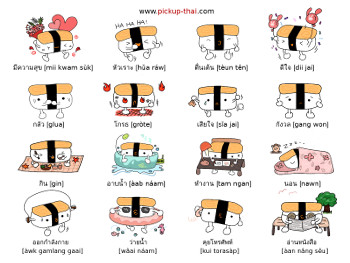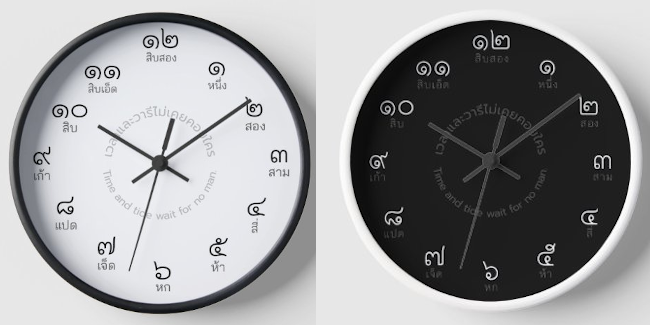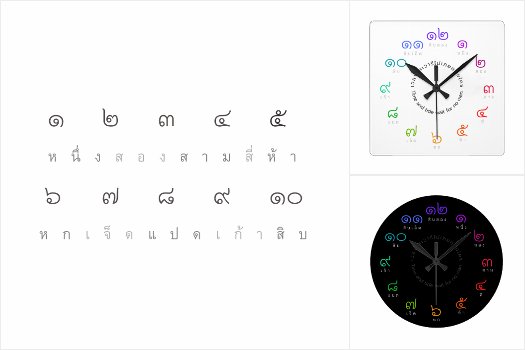In this lesson, khru Yuki Tachaya teaches the meanings and uses of the word “เอาไว้ [ao wái],” which is frequently used in everyday life but hardly explained in textbooks. She also gives various examples of sentences using this word. After watching this video, you will understand how to use this expression in different contexts.…
Continue reading The Meaning & Use of “(เอา)ไว้ [(ao) wái]”Yuki & Miki @ PickupThai

Choose the right resolution for your screen, and right-click on the image to save it to your computer.




Vocabulary
มีความสุข [mii kwam sùk] To be happy
หัวเราะ [hǔa ráw] To laugh
ตื่นเต้น [tèun tên] To be excited
ดีใจ [dii jai] To be happy (fleetingly)
กลัว [glua] To be scared / afraid
โกรธ [gròte] To be angry
เสียใจ [sǐa jai] To be sad / sorry
กังวล [gang won] To be worried
กิน [gin] To eat
อาบน้ำ [àab náam] To take a bath / shower
ทำงาน [tam ngan] To work
นอน [nawn] To sleep
ออกกำลังกาย [àwk gamlang gaai] To exercise
ว่ายน้ำ [wâai náam] To swim
คุยโทรศัพท์ [kui torasàp] To talk on the phone
อ่านหนังสือ [àan nǎng sěu] To read a book
The character featured in this wallpaper appears in PickupThai’s E-picture Book for Learning Thai “The Unforgettable Day of Forgetful Tamago.…
Continue reading Wallpaper 9: Feelings & Daily Actions
ในชีวิตนี้
[nai chiiwít níi]
In this life…
สิ่งใดที่อยู่เหนือการควบคุมของคุณ
[sìng dai tîi yùu něua gaan khûap khum kwǎng khun]
Whatever is beyond your control
สิ่งนั้นกำลังสอนให้คุณรู้จักปล่อยวาง
[sìng nán gamlang sǎwn hâi khun rúu jàk plòi waang]
is teaching you how to let go.
[ V o c a b u l a r y – – – *]
ชีวิต [chiiwít] life
สิ่ง [sìng] thing
ใด [dai] which
ที่ [tîi] that… (relative pronoun)
เหนือ [něua] beyond
การควบคุม [gaan khûap khum] control
สอนให้ [sǎwn hâi] to teach (someone)..…

กฎของบ้าน
[gòt kwǎng bâan]
House Rules
1. เมียต้องถูกเสมอ
[mia tâwng tùuk saměr]
The wife is always right.
2. เมื่อไรที่คิดว่าเมียผิด ให้ย้อนกลับไปดูข้อที่ 1
[mêua rài tîi kít wâa mia pìt, hâi yáwn glàp pai duu kâw tîi nèung]
Whenever you think she is wrong, go back and read rule number 1.
Vocabulary – – – *
เมีย [mia] a colloquial informal term for “ภรรยา [panrayaa]” meaning “wife”
ถูก [tùuk] right, correct
เสมอ [saměr] always
เมื่อไรที่ [mêua rài tîi] whenever…
คิด(ว่า) [kít (wâa)] to think (that)…
ผิด [pìt] wrong
ให้ + verb [hâi] imperative form (used in a command or instruction)
ย้อนกลับ [yáwn glàp] to go back
ดู [duu] to look at, to see
ข้อที่ [kâw tîi] item… (in a list), number…
Remark*
“เมื่อไร [mêua rai]” is the way the word is written, but when spoken it’s usually pronounced as “เมื่อไหร่ [mêua rài].”…
The expression “…ไปอย่างนั้น(แหละ)” [pai yàang nán (làe)]” is a commonly used colloquial idiom. It’s used to imply that the action was not done for any purpose. The nearest meaning in English may be “for the sake of it” or “for no particular reason” but it can be translated in many ways depending on the context.…
Continue reading …ไปอย่างนั้น(แหละ) “pai yàang nán (làe)”
ทำไมผู้ชายถึงชอบผู้หญิงผมยาว
[tammai pûu chai těung châwp pûu yǐng phǒm yaao]
Why do guys like girls with long hair?
เพราะผู้หญิงผมยาวมักดูแลผมเป็นพิเศษ
[práw pûu yǐng phǒm yaao mák duu lae phǒm pen phísèet]
Because girls with long hair tend to take special care of their hair/me.
Vocabulary – – – *
ผม [phǒm] hair / first person pronoun “me” used by males.…
Continue reading Girls with Long HairIn this video, khru Yuki Tachaya talks about the common mistakes Thai learners tend to make when composing a sentence expressing their wants and desires. She teaches how to express that you want something, want to do something and want someone else to do something by using “อยากมี [yàak mii]”/”อยากได้ [yàak dâai]”, “อยาก [yàak] + verb” and “อยากให้ [yàak hâi]” respectively.…
Continue reading How to Express Wants And DesiresEveryone knows how to say “Thank you” in Thai – “ขอบคุณ” [khàwp khun]. But did you know how to let someone know what you thank them for? There are two structures that you can use when you want to express your thanks to someone, which are as follows;
1. ขอบคุณ [khàwp khun] + สำหรับ [sǎmràp] + noun
2.…

4 ตัวอักษรที่ทำให้ผู้หญิงหัวใจเต้นแรงสุด ไม่ใช่คำว่า “LOVE”
[sìi tua àk sǎwn tîi tam hâi pûu yǐng hǔa jai tên raeng sùd mâi châi kam wâa “LOVE”]
The 4 letters that make a woman’s heart beat the fastest aren’t “LOVE”
แต่เป็นคำว่า “SALE”
[tâe pen kam wâa “SALE”]
but “SALE.”
Vocabulary
ตัวอักษร [tua àk sǎwn] letter, character
ทำให้ [tam hâi] to make, to cause
หัวใจ [hǔa jai] heart
เต้น [tên] to dance (in this context, “to beat”)
แรง [raeng] strong, strongly
สุด [sùd] the most (derived from “ที่สุด [tîi sùd]”)
คำว่า [kam wâa] the word…
Click here to learn more about the word “ว่า [wâa]”…
Continue reading The Four LettersThe word แย่ [yâe] is an adjective meaning “bad” or “terrible.” For example, “อากาศแย่” [aagàat yâe] bad weather, “รสชาติแย่” [rótchâat yâe] bad taste or “นิสัยแย่” [nísǎi yâe] bad attitude. However, when used as an adverb to intensify an adjective, it means “badly” or “terribly” as in “very” or “to a great degree.”…
Continue reading ~แย่(เลย) “yâe (loei)”A unique display of the numbers 1-10 written in Thai numerals and spelled out by name in Thai script on various useful products including clocks, watches, T-shirts, mouse pads, mugs and phone cases.
Featured Products
 |
 |
 |
 |
 |
 |
 |
 |
Click here to see all products from this collection.

Wall clock with the hours written in Thai numerals and spelled out in Thai script.…
In this video, khru Yuki Tachaya explains the uses of all the four different verbs that Thai people use to express ability, which are เป็น [bpen] ได้ [dâai] ไหว [wǎi] and ออก [àwk]. She also talks about some common mistakes that Thai learners use regarding this subject. After watching this video, you will be able to say what you know how to do and use each verb in the correct contexts and sound natural like a Thai person.…
Continue reading How to Express Ability in Thaithat teach you to speak real and natural-sounding Thai,
Our unique humor-filled lessons will have you feel like
you’re just listening to fun stories, not studying.
Forget the dry boring textbooks you have been using
and learn “Real Spoken Thai” with us!…
“ไม่ A ก็ B” [mâi…gâw…] is equivalent of the expression “either A or B” in English. The direct translation of “ไม่ A ก็ B” [mâi…gâw…] is “A, if not, B.” It’s also possible to say “A ไม่ก็ B” […mâi gâw…].
Examples:
วางไว้หน้าตู้เย็นไม่ก็หน้าทีวีดีกว่า
[waang wái nâa tûu yen mâi gâw nâa TV dii gwàa]
I think we should put it either in front of the fridge or the TV.…



